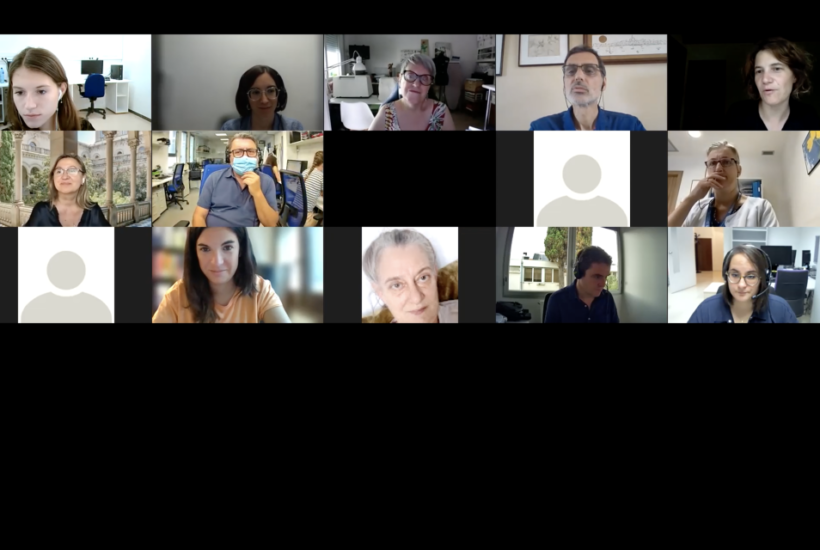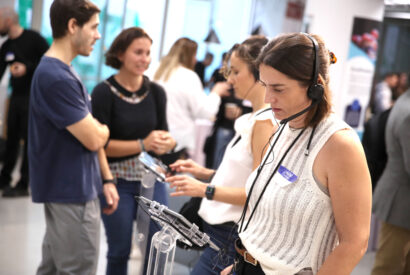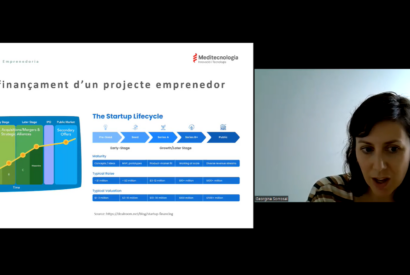Leap from the “laboratory” to the practical application: technologies available to people and professionals
How to transfer technology beyond research? Learn about the opportunities to create technological solutions at the service of people from researchers expert in creating spin-offs at the Network's IX B&L, held this Wednesday. Did you miss it or do you want to see it again? Video of the session available deferred!

The Network’s 9th Breakfast & Learn has emphasized key aspects for transferring knowledge from the hand of mental health researchers: the process of creating a spin-off, some learnings and future challenges
The applicability of the research carried out by researchers in the form of technological solutions for society, put into practice in the form of spin-offs, is key to improving the care and treatment of affected people and becomes a support tool by frontline professionals. This has been one of the central points of the TECSAM Network’s 9th Breakfast & Learn, entitled “From the idea to the market: spin-offs created from mental health research”.
According to one of the speakers at the session, Elisenda Currius, representative of the Associació Diversitat Funcional d’Osona (ADFO), research must transcend the boundaries of the laboratory, research centers and universities to “become a solution for the affected people”. With this shared vocation, this social entity and the team of the “Multimedia Applications and ICTs Laboratory” research group at the UPC, a member group of the TECSAM Network, have found a fit to develop MUVITY, a virtual reality-based project that offers telerehabilitation to improve the quality of life of patients with chronic injuries, and which is currently in the process of becoming a spin-off.
4 essential elements for setting up a spin-off
Mentoring and counseling programs
Currius believes that the research community investigations should not remain on a simple paper, and MUVITY is an example that technology is highly useful and should be put at the service of users. Likewise, she has emphasized the importance of mentoring and accompaniment programs for spin-offs, as she believes they are essential for training, especially at the beginning, in regulatory matters and protection of the technological solution.
Along these same lines, another of the speakers, Guillem Feixas, IP of the Intervention Group in Clinical Psychology and Health of the University of Barcelona, co-founder and partner of the spin-off Mind&Identity (Eyme) – a digital platform that uses reality in the psychotherapeutic field to improve the personal skills of affected people – has confirmed that consultancies for spin-offs are critical at specific times, especially to define the business model before setting up the company. However, beyond the consultancies that spin-offs can take advantage of, Feixas has pointed out the lack of financing and aid to carry out the projects.
Calls, forums and open days
Apart from consultancies, Elisenda considers that, in this initial phase of the setting up of a spin-off, which is often a “desert” phase, it is crucial to look for calls that give rise to the transfer of knowledge and that facilitate aid for projects for further development. In fact, MUVITY is a project that emerged as a result of a call launched by accelerators, in this case, by DKV.
The representative of the association of affected people wanted to claim the significant role that the TECSAM Network plays in the entire mental health innovation ecosystem, and pointed out that it is an “ally” for research groups and entities that want to launch projects together. Likewise, Currius has ensured that all the activities it promotes, in the form of forums, virtual conferences or face-to-face events, are a great opportunity to share experiences, learning, good practices, failures and success stories. “The TECSAM Network is an essential network in this desert”, she concluded.
Research-society collaborations
Technology as a complementary tool to support health professionals has been another issue that has been put on the table. The speaker Petia Radeva, IP of the Computer Vision and Machine Learning group of the Computer Vision Center (CVC) and the University of Barcelona (UB), a member group of the Network, and co-founder of the spin-off AIGecko Technologies– an application based on deep learning and artificial intelligence that uses algorithms to analyze the nutritional information of food – has addressed the need to provide professionals with technological solutions to more efficiently carry out their day-to-day clinical practice.
In this regard, Radeva has broken a lance for research, claiming that it provides the health system with technologies that can respond to the lack of professionals, as well as contributing to improving its task. She has pointed out the need to educate these professionals who are in the front line so that they come into contact with the terms coined by technology, such as artificial intelligence, deep learning, machine learning, etc.
“Technology makes sense when it is together with health” has concluded Radeva in this matter. Therein lies, she pointed out, the importance of continuing to develop collaborations between mental health research and the entities, institutions or associations working with people. Likewise, although collaborative projects or spin-offs are a complex and long process, Currius has pointed out that creating spaces and meeting points between the two worlds (research and health/assistance) are key “to finding solutions for people” and encouraging collaborations and projects.
Research team commitment
The speakers have agreed that one of the essential pieces to give continuity to any spin-off is the team. According to Radeva, “80% of the success of a spin-off or any project is the team” and she considers that, in particular, the figure of the doctoral student plays a crucial role in projects of this type. “Having this figure of the doctoral student is key to bringing the solution closer to the market and exploring it commercially,” said Radeva, who considers that the main researchers (especially if they are also teaching) cannot often focus exclusively on the development of the project, and having a doctoral student at your disposal guarantees the survival of many projects.
Additionally, Radeva has stressed that, often, the doctoral student’s is that of an enterprising person, with a concern to transfer technology so that it has an applicability in society and a positive impact on people, and she ensures that, in her particular case, the doctoral figure has been essential for the development and release of the spin-off AIGecko.
For its part, Elisenda highlighted the heterogeneity of the team responsible for creating MUVITY, made up of engineers and developers from LAM, but also clinical professionals and psychotherapists from ADFO who work daily with people with disabilities who are part of of the organization, which allows to keep the people affected in the spotlight.
In this sense, Guillem Feixas considers that, in view of the insufficient support given to spin-offs, the commitment of the team’s people is a decisive factor. He notes that it is often difficult to find specialized partners in both fields, psychotherapy and sales, which means greater involvement by team members in consolidating Mind&Identity, created in 2021.
This virtual meeting has given all attendees the opportunity to learn about three experiences and real cases of mental health researchers who have started spin-offs or are in the process of doing so. The day has sparked the collaborative debate between the speakers and the attendees and has generated interest around the perceptions and solutions presented by the latter. Led by Petia Radeva, Guillem Feixas and Elisenda Currius, essential aspects to consider when creating a spin-off have been addressed, as well as learnings and challenges that they must face in the future to carry out their projects.
You can consult the program of the day and more information about the session in the following link.

